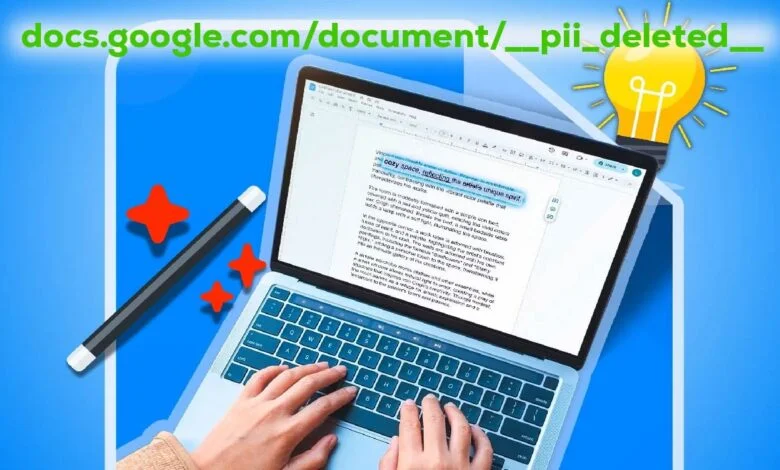Understanding docs.google.com/document/__pii_deleted__ and Data Privacy Risks
Our discussion on docs.google.com/document/__pii_deleted__, a topic that connects directly to the world of personal data protection and online privacy. In today’s digital environment, the way information is stored and shared can sometimes lead to unexpected risks. Among these is the unintentional exposure of Personal Identifiable Information (PII) through online platforms such as Google Docs.
When a file or document contains sensitive details and is shared incorrectly, it can sometimes become accessible to more people than intended. In certain situations, this may even allow the content to appear in search results, raising serious concerns for individuals and organizations.
What the Term Means
The phrase docs.google.com/document/pii_deleted refers to an online document link that has been modified or flagged because it once contained personal information that was later removed. “PII deleted” signals that data identifying a person — such as a name, address, or contact information — was taken out for privacy reasons.
This marker can show up in different contexts:
- When Google’s systems detect sensitive information in a document and take steps to protect it.
- When a document’s link remains online but the content inside has been edited to remove PII.
- When search engine records or cached data point to a now-sanitized version of a file.
How PII Can Appear Online
The appearance of PII in a public Google Doc is often accidental rather than deliberate. It can happen through:
- Incorrect Sharing Settings
Choosing “Anyone with the link can view” without realizing the link is indexed by search engines. - File Transfers Without Review
Uploading documents that contain full names, identification numbers, or addresses without removing those details. - Copy-Paste from Emails or Forms
Adding content directly from private communications without stripping out private fields. - Unsecured Collaboration
Inviting contributors without checking their permissions, allowing them to copy or share beyond the intended audience.
Why This Is a Concern
The main issue with docs.google.com/document/pii_deleted is that it represents a moment when privacy was at risk. Even if the PII is later removed, there may be a window of time when unauthorized individuals could have accessed it.
Sensitive information in the wrong hands can lead to:
- Identity theft – Using personal details to open accounts or make fraudulent claims.
- Harassment or scams – Targeting an individual through phone calls, emails, or fake messages.
- Reputation harm – Sharing private data that can damage a person’s credibility or safety.
How Google Handles It
Google has internal processes to protect user information. If a document is reported or detected to contain PII, measures may include:
- Content removal from search results.
- URL filtering to prevent further indexing.
- User notifications reminding the document owner to change sharing settings.
The “pii_deleted” notation often signals that such a cleanup action took place. However, users themselves must take responsibility to ensure documents are private before sharing them.
Steps to Prevent Exposure
Keeping personal data safe in shared documents requires a combination of awareness and good digital habits:
- Check Sharing Options
Before sending a Google Docs link, confirm whether it’s restricted to specific people or set to public view. - Review Before Uploading
Scan for any PII — names, emails, ID numbers — and remove or replace it with generic placeholders. - Use Redaction Tools
Instead of deleting visible text only, use proper redaction so that hidden layers or revision history don’t reveal sensitive data. - Disable Indexing
If the file must be shared publicly, ensure that search engines are not allowed to index it. - Regularly Audit Files
Go through shared files periodically to check for outdated permissions or lingering public links.
What to Do If It Happens
If you notice your document showing up as docs.google.com/document/pii_deleted or suspect your data was exposed:
- Change document permissions immediately to “Restricted.”
- Remove sensitive information and save a new version.
- Request removal from search results via Google’s removal tool.
- Notify affected parties if their information was part of the document.
- Monitor for misuse by keeping an eye on suspicious account activity or unusual messages.
The Human Factor in Digital Privacy
Technology platforms like Google offer advanced privacy settings, but the real safeguard lies in user behavior. Many exposures happen simply because someone did not realize how broadly a document link could spread. The key is to treat every shared document as if it could be made public, and act accordingly.
A single overlooked spreadsheet, meeting note, or form response can contain enough PII to create serious consequences. By cultivating habits of careful sharing, users reduce the chances of encountering the “pii_deleted” scenario altogether.
Looking Forward
The notation docs.google.com/document/__pii_deleted__/pii_deleted is more than a technical marker — it’s a reminder of how fragile online privacy can be. As more work, communication, and record-keeping move into cloud platforms, the responsibility for safeguarding personal data increases for everyone involved.
By understanding what causes this kind of privacy flag, and how to prevent it, individuals and organizations can better protect themselves from accidental exposure. The lesson is clear: digital convenience should never come at the cost of data security.






